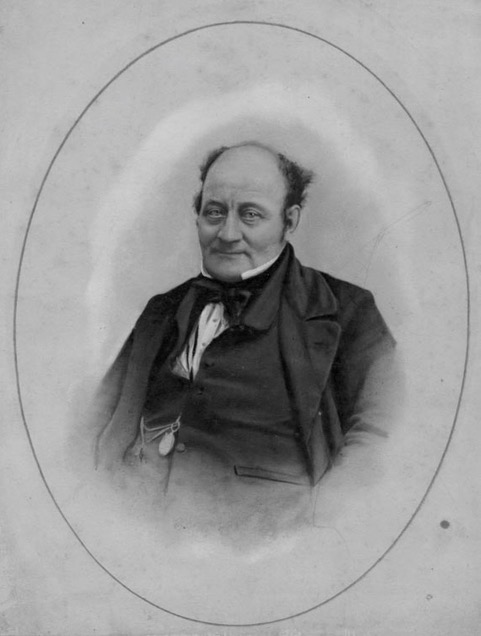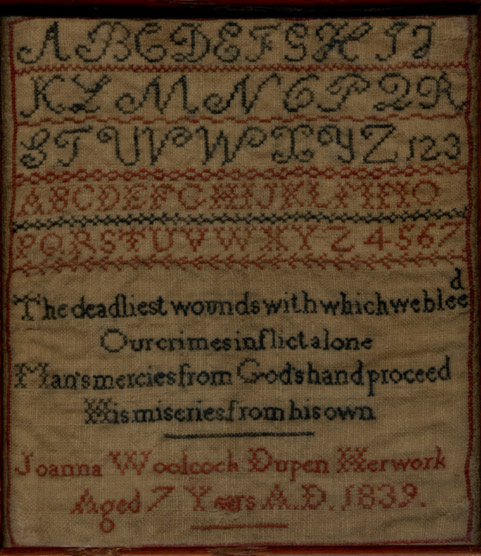

We’ve recently added a new book to the library collections. A Cornish Cargo: The Untold History of a Victorian Seafaring Family, by Alison Baxter. It tells the true story of Alison’s ancestors, from their move to Hayle to their subsequent adventures throughout the 19th century. Her blog follows below.
A Cornish Cargo
In 1839 a little girl stitched a neat sampler, the hundreds of tiny crosses displaying her command of the alphabet, the verse a reminder of her Christian faith. The child, Joanna Woolcock Dupen, was born in 1832 in Penzance, and baptised in the Wesleyan chapel there. According to the certificate, her father was working as a confectioner, which seems a remarkably tame occupation for a man who had previously sailed out of Falmouth to Ireland and the Mediterranean, braving the heavy seas in a small, single-masted cutter. He must soon have tired of stirring vats of sugar to satisfy the sweet tooth of the townsfolk, because when Joanna was three years old, the family moved to Hayle. Her father, Sharrock Dupen, had taken the job of steward on the new steam packet Herald, a vessel that was to transform the journey from Cornwall to Bristol.
The child Joanna was my great-grandmother’s oldest sister, the first of a long family of thirteen, and Sharrock Dupen was my great-great-grandfather. An ordinary man, like most of our ancestors, but emblematic of an age when the power of steam was changing the world. Every week, the wooden Herald set off from the quay at Hayle, over the sandy bar and out into the bay for the overnight journey along the north coast, past the treacherous rocks of Hartland Point and into the mouth of the Avon. She carried tin, copper and iron goods from the foundries, returning with a cargo of everyday necessities for the shopkeepers of Hayle: coffee, butter, soap, needles, candles and buttons. Sharrock Dupen, a rotund, cheerful man, as we can see from his portrait, supplied the passengers with food, drink and reassurance. ‘We shall have a voyage as calm as a sail in a duck pond,’ he told one anxious traveller mendaciously.
When I inherited Joanna’s sampler, it inspired me to trace the history of the Dupens. I knew little about them apart from the fact that they were said to be of Huguenot origin. The one story I had been told was, I thought, bound to be apocryphal. We all inherit family myths that we enjoy without fully believing in them. Mine is about vegetables. In the 1930s my grandfather, a sceptical engineer, wrote this letter to the editor of the Morning Post: Mr Dupen’s Grandchild on a Family “Fairy Story”
Sir – With regard to your announcement about the Cornish Broccoli industry in Saturday’s issue of the “Morning Post”, as children we were often told that our grandfather – the Mr Dupen mentioned – first grew Broccoli in England, but I’m afraid we rather regarded this as some subtle kind of fairy story to encourage our appetite for the vegetable! From the announcement it would appear that he really was interested in the broccoli plant, but are there any records to show that he did actually introduce the plant into England, and if so, from where?
He thought it was a fantasy and so did my father, who passed it on to me and my brother as way of encouraging us to eat our greens. But now that the newspaper archive is searchable online, I was able to uncover the true story of how my great-great-grandfather is credited with rescuing the economy of Cornwall.
He was not in fact the first to grow broccoli but the first to transport it from Hayle to Bristol in the 1830s. An initial shipment of four dozen heads became fourteen dozen the following week and Sharrock Dupen had a virtual monopoly of the local trade until the growers themselves cut him out. Twenty years later, the steamer from Hayle was transporting 860 baskets containing fifteen to eighteen dozen heads of broccoli each. In a commemorative speech in 1933, the Lord Mayor of Bristol attributed the prosperity of Cornwall to this vegetable trade. The miner, so it was said, had become the broccoli grower.
My book, A Cornish Cargo, started with Sharrock Dupen but turned into an account of how his children also had their lives changed by the coming of steamships and railways. The boys went to sea at a time when it had become possible to serve as an engineer instead of an ordinary sailor and I was able to trace their voyages around the world. The girls too left home, travelling by steam packet to Bristol and onwards by the Great Western Railway to take up posts as governesses and schoolteachers. The only Dupens left in Cornwall now lie in the churchyard in Hayle. People sometimes tell me I’m lucky to have such interesting ancestors to write about, but I believe everyone has family stories that are worth telling. History is not just about famous people, battles, and politics. It’s about how ordinary people lived their everyday lives.
